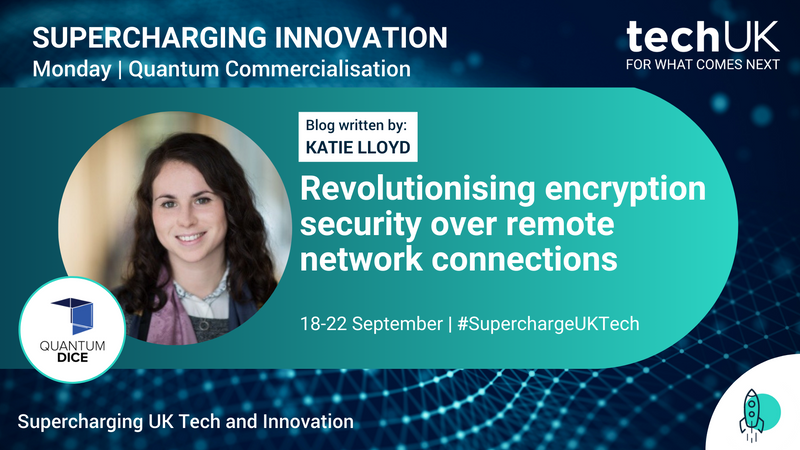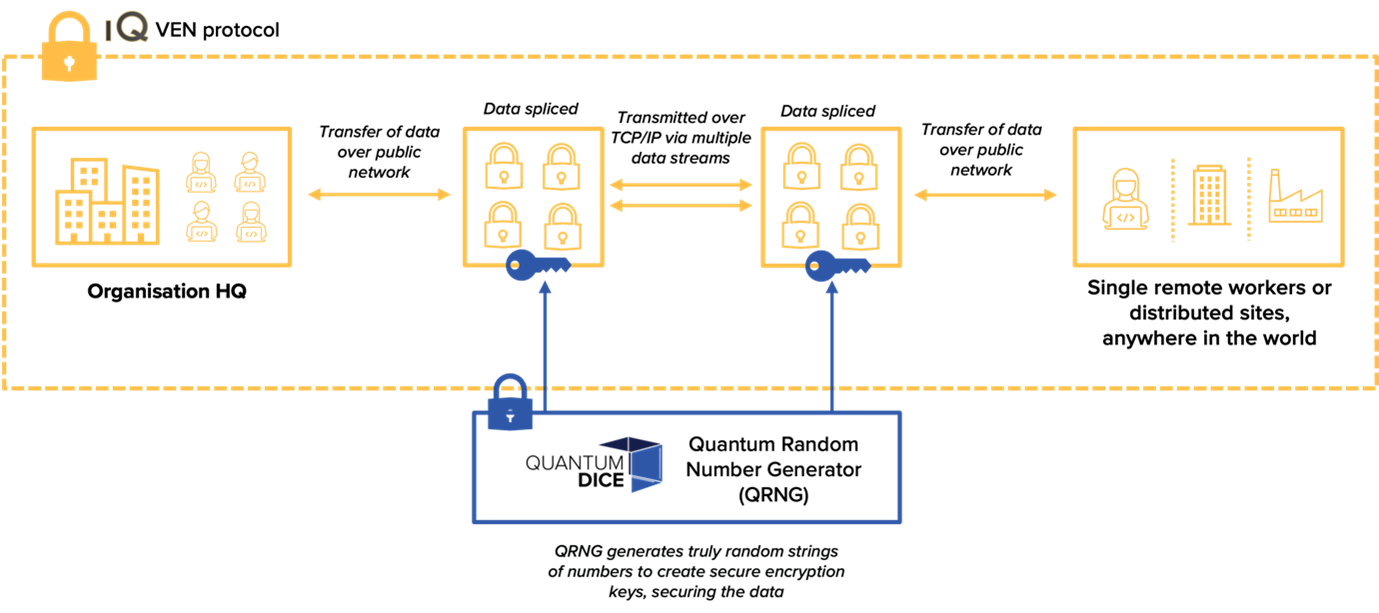Revolutionising encryption security over remote network connections

Earlier this year, the UK government set out its vision to be a leading quantum-enabled economy by 2033. The pace of progress towards the commercialisation of quantum technologies is accelerating with some real examples of commercially viable solutions emerging. A partnership between Quantum Dice and iQuila has resulted in a solution that demonstrates the commercial application of quantum technologies right now. iQuila's Virtual Extended Network (VEN) platform (a more robust and faster alternative to a VPN), can now be offered as a quantum-enhanced solution that encompasses Quantum Dice's self-certifying Quantum Random Number Generator (QRNG) to deliver unrivalled encryption security over remote network connections.
Hear from the team at iQuila – David Sweet (CEO), Richard Hill (CTO), and Ian Williams (Head of Partnerships and Talent) – and learn about their journey to being an early adopter of quantum technologies, the commercial benefits of the solution, and its real-world applications.
How would you describe iQuila's VEN (Virtual Extended Network) protocol and how it addresses the security and performance challenges posed by traditional VPNs?
Richard: Our VEN protocol is a Software-Defined Networking (SDN) solution that delivers a seamless and reliable Layer 2 networking experience for remote users or multi-site organisations. It’s faster and more robust than a traditional VPN, which operates at Layer 3.
David: It’s seamless because it’s like having a virtual ethernet cable that connects any mobile device, or multiple sites, to a head office as though they were in the same room.
We often use a rope analogy to describe the robustness. Our VEN protocol has 8 strands, whereas a VPN connection only has one. If one strand breaks – and we expect one to break, especially if a mobile connection is used – we’re able to rebuild that strand of lost connection dynamically.
When did you first come across quantum technologies?
Ian: We first came across quantum technologies in the context of a commercial solution that could be integrated with ours when we were first introduced to Quantum Dice via Cranfield University.
It was very much a ‘meeting of minds’ between the two companies. We showed Quantum Dice what our solution could do, and the Quantum Dice team showed us how they could help us to do it even better by utilising their self-certifying QRNG technology.
Why did you choose to be an early adopter of quantum technologies?
Richard: We saw the potential of quantum technology and how it could enhance our solution. We strive to have the best possible solution to offer our customers and it was evident that quantum is superior to the current technology.
Ian: Given the exponential increase in processing power and the trajectory of its development, we believe that quantum encryption is set to become mandatory.
Currently, some see this as being somewhat futuristic. But if you consider the capabilities of the processing power being introduced, this isn't a discussion of a scenario five years ahead. Instead, quantum encryption is on the verge of becoming a requirement.
How does Quantum Dice’s self-certifying DISCTM QRNG work with the iQuila VEN solution to create a quantum-enhanced network security solution?
Richard: Our VEN protocol takes Layer 2 traffic, and splits data into small packets. Quantum Dice’s QRNG then generates truly random strings of numbers to create encryption keys, securing that data.

For a more detailed look at how the technology works, download the technical deck here.
How important are Quantum Dice’s source-device independent self-certification (DISCTM) protocol and fast generation rates in helping to deliver unrivalled encryption?
Richard: Both features translate into practical benefits. The DISCTM protocol guarantees that the random numbers used to generate encryption keys are truly random. The fast generation rates mean we can have much longer encryption keys – the standard key length is 128 bits or 256 bits, yet we’re currently using 4096 bits, and that’s down to the phenomenal data generation rates.
Ian: The best way to describe the benefits for customers is that they would be getting the best-in-class solution. We don’t think that there’s a better partnership out there. Together we’re providing the best connectivity in the world and then preventing people from gaining access to that using cutting-edge quantum-enabled technology.
iQuila recently announced its position as a Technology Alliance Partner with Cradlepoint. The partnership is centered around addressing connectivity challenges faced by mobile workers, including those in emergency services. Could you share some of the challenges mobile workers encounter?
Ian: Cradlepoint are specialists in cellular connectivity and this type of connectivity has limitations. Connectivity challenges can be problematic for timely and efficient communication.
Richard: If we take the example of emergency personnel working in the field, taking an additional 30 seconds or more to reconnect so they can communicate with essential applications during a crisis situation could have serious implications.
In this situation, our solution can recreate the experience of a direct connection. The cellular router is essentially connecting to mobile workers via a virtual cable, meaning they are all on the same network, and wrapped around that is Quantum Dice’s QRNG for enhanced encryption.
David: In October, we’ll be exhibiting the iQuila and Quantum Dice joint solution at Cradlepoint’s Partner Summit. People can visit us there to learn more.
Are there any other exciting projects in the works that you can share?
Richard: Yes, we’re working on a project to synchronise drones with Cranfield University, funded by an Innovate UK grant, called “UTC Time Dissemination”, which also uses Quantum Dice’s QRNG technology. Drones need to know the exact time as they share important data like their location and speed. Since they aren't directly connected, there's often a delay, which is the problem we're solving.
We will be running a demonstration at Cranfield’s DARTeC Centre in March 2024. If anyone is interested in attending, contact me at [email protected].
To find out how Quantum Dice and iQuila’s solution can benefit your organisation, get in touch.
techUK – Unleashing UK Tech and Innovation
The UK is home to emerging technologies that have the power to revolutionise entire industries. From quantum to semiconductors; from gaming to the New Space Economy, they all have the unique opportunity to help prepare for what comes next.
techUK members lead the development of these technologies. Together we are working with Government and other stakeholders to address tech innovation priorities and build an innovation ecosystem that will benefit people, society, economy and the planet - and unleash the UK as a global leader in tech and innovation.
For more information, or to get in touch, please visit our Innovation Hub and click ‘contact us’.
Latest news and insights
Other forms of content
Sprint Campaigns
techUK's sprint campaigns explore how emerging and transformative technologies are developed, applied and commercialised across the UK's innovation ecosystem.
Activity includes workshops, roundtables, panel discussions, networking sessions, Summits, and flagship reports (setting out recommendations for Government and industry).
Each campaign runs for 4-6 months and features regular collaborations with programmes across techUK.
techUK's latest sprint campaign is on Robotics & Automation technologies. Find out how to get involved by clicking here.
Running from September to December 2023, this sprint campaign explored how the UK can lead on the development, application and commercialisation of space technologies, bring more non-space companies into the sector, and ultimately realise the benefits of the New Space Economy.
These technologies include AI, quantum, lasers, robotics & automation, advanced propulsion and materials, and semiconductors.
Activity has taken the form of roundtables, panel discussions, networking sessions, Summits, thought leadership pieces, policy recommendations, and a report. The report, containing member case studies and policy recommendations, was launched in March 2024 at Satellite Applications Catapult's Harwell campus.
Get in touch below to find out more about techUK's ongoing work in this area.
Event round-ups
Report
Insights
Get in touch
Running from January to May 2024, this sprint campaign explored how the UK can lead on the development, application and commercialisation of the technologies set to underpin the Gaming & Esports sector of the future.
These include AI, augmented / virtual / mixed / extended reality, haptics, cloud & edge computing, semiconductors, and advanced connectivity (5/6G).
Activity took the form of roundtables, panel discussions, networking sessions, Summits, and thought leadership pieces. A report featuring member case studies and policy recommendations was launched at The National Videogame Museum in November 2024.
Get in touch below to find out more about techUK's future plans in this space.
Report
Event round-ups
Insights
Get in touch
Running from July to December 2024, this sprint campaign explored how the UK can lead on the development, application and commercialisation of web3 and immersive technologies.
These include blockchain, smart contracts, digital assets, augmented / virtual / mixed / extended reality, spatial computing, haptics and holograms.
Activity took the form of roundtables, workshops, panel discussions, networking sessions, tech demos, Summits, thought leadership pieces, policy recommendations, and a report (to be launched in 2025).
Get in touch below to find out more about techUK's future plans in this space.
Event round-ups
Insights
Get in touch
Running from February to June 2025, this sprint campaign is exploring how the UK can lead on the development, application and commercialisation of robotic & automation technologies.
These include autonomous vehicles, drones, humanoids, and applications across industry & manufacturing, defence, transport & mobility, logistics, and more.
Activity is taking the form of roundtables, workshops, panel discussions, networking sessions, tech demos, Summits, thought leadership pieces, policy recommendations, and a report (to be launched in Q4 2025).
Get in touch below to get involved or find out more about techUK's future plans in this space.
Upcoming events
Insights
Event round-ups
Get in touch
Campaign Weeks
Our annual Campaign Weeks enable techUK members to explore how the UK can lead on the development and application of emerging and transformative technologies.
Members do this by contributing blogs or vlogs, speaking at events, and highlighting examples of best practice within the UK's tech sector.
Summits
Tech and Innovation Summit 2025
Tech and Innovation Summit 2023
Tech and Innovation Summit 2024
Receive our Tech and Innovation insights
Sign-up to get the latest updates and opportunities across Technology and Innovation.



























































